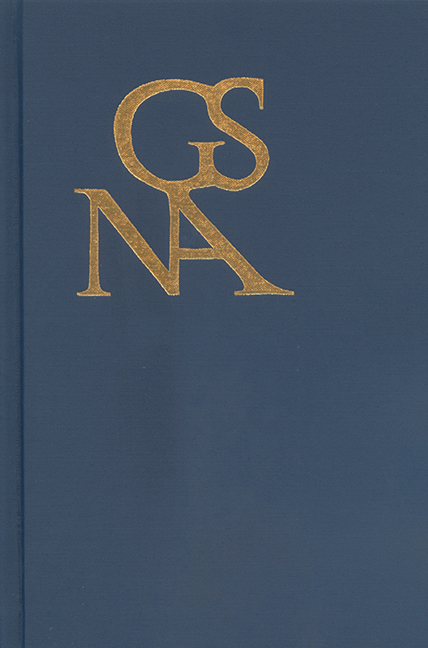Book contents
- Frontmatter
- Contents
- Special Section on Goethe and the Postclassical: Literature, Science, Art, and Philosophy, 1805–1815
- Helena, Then Hell: Faust as Review and Anticipation of Modern Times
- Histrionic Nationality: Implications of the Verse in Faust
- Die Wette in Goethes Faust
- Ecocriticism, the Elements, and the Ascent/Descent into Weather in Goethe's Faust
- Grablegung im Vorhof des Palasts: Groteske Anschaulichkeit in den vorletzten Szenen von Faust II
- Goethes Gnostiker: Fausts vergessener Nihilismus und sein Streben nach Erlösungswissen
- The Unconscious of Nature: Analyzing Disenchantment in Faust I
- Forms of Figuration in Goethe's Faust
- Goethe's Morphology of Knowledge, or the Overgrowth of Nomenclature
- Paraphrasis: Goethe, the Novella, and Forms of Translational Knowledge
- Dramas of Knowledge: The “Fortunate Event” of Recognition
- gegen: Bewegungen durch Goethes “Der Mann von funfzig Jahren”
- “Offenbares Geheimnis” oder “geheime Offenbarung”? Goethes Märchen und die Apokalypse
- Goethe's Green: The “Mixed” Boundary Colors in Zur Farbenlehre
- For Heaven's Sake, I Will Have You Walk into the Dark: Grillparzer's Containment of Beethoven and the Ambivalence of Their Melusina Project
- Imitation, Pleasure, and Aesthetic Education in the Poetics and Comedies of Johann Elias Schlegel
- Feindlich verbündet: Lessing und die Neuen Erweiterungen der Erkenntnis und des Vergnügens
- Juvenalian Satire and the Divided Self in Goethe's “Das Tagebuch”
- Book Reviews
Juvenalian Satire and the Divided Self in Goethe's “Das Tagebuch”
from Special Section on Goethe and the Postclassical: Literature, Science, Art, and Philosophy, 1805–1815
Published online by Cambridge University Press: 14 March 2018
- Frontmatter
- Contents
- Special Section on Goethe and the Postclassical: Literature, Science, Art, and Philosophy, 1805–1815
- Helena, Then Hell: Faust as Review and Anticipation of Modern Times
- Histrionic Nationality: Implications of the Verse in Faust
- Die Wette in Goethes Faust
- Ecocriticism, the Elements, and the Ascent/Descent into Weather in Goethe's Faust
- Grablegung im Vorhof des Palasts: Groteske Anschaulichkeit in den vorletzten Szenen von Faust II
- Goethes Gnostiker: Fausts vergessener Nihilismus und sein Streben nach Erlösungswissen
- The Unconscious of Nature: Analyzing Disenchantment in Faust I
- Forms of Figuration in Goethe's Faust
- Goethe's Morphology of Knowledge, or the Overgrowth of Nomenclature
- Paraphrasis: Goethe, the Novella, and Forms of Translational Knowledge
- Dramas of Knowledge: The “Fortunate Event” of Recognition
- gegen: Bewegungen durch Goethes “Der Mann von funfzig Jahren”
- “Offenbares Geheimnis” oder “geheime Offenbarung”? Goethes Märchen und die Apokalypse
- Goethe's Green: The “Mixed” Boundary Colors in Zur Farbenlehre
- For Heaven's Sake, I Will Have You Walk into the Dark: Grillparzer's Containment of Beethoven and the Ambivalence of Their Melusina Project
- Imitation, Pleasure, and Aesthetic Education in the Poetics and Comedies of Johann Elias Schlegel
- Feindlich verbündet: Lessing und die Neuen Erweiterungen der Erkenntnis und des Vergnügens
- Juvenalian Satire and the Divided Self in Goethe's “Das Tagebuch”
- Book Reviews
Summary
“DAS TAGEBUCH” HAS A UNIQUE PLACE in Goethe's poetic oeuvre. In twenty-four stanzas of ottava rima, narrated for the most part in the first person, it tells the story of an erotic adventure that occurs by mishap. When his carriage breaks down several miles short of home and his matrimonial bed, the poem's narrator is forced to spend a night at an inn, where he is captivated by an initially innocent waitress. Not only is the incident caused by a breakdown, it is also ruled by one, for the midnight assignation that he arranges with the girl ends in disaster, when his potency deserts him. As the girl sleeps, he recalls his proud erection when standing before the altar on his wedding day, and the memory in turn stimulates him to arousal. But instead of taking advantage of his arousal, he exercises renunciation, and the poem ends by drawing a fairly conventional moral on the theme of the power of love.
The poem's combination of obscenity and blasphemy—in recalling his wedding day the narrator apostrophizes a “bloodstained Christ” on his “cross of misery” (“vor deinem Jammerkreuz, blutrünstger Christe,” line 135)—made “Das Tagebuch” unpublishable, and it first appeared in a private edition of 1861. It is absent from some of the standard editions—the Jubiläumsausgabe and the Hamburger Ausgabe, for instance—and in the Weimarer Ausgabe it appears only in small type in the endnotes to the last volume of poems (WA 1.5). Once marginal to the canon, the poem is now central to our understanding of Goethe. In the first place, it is a shining example of the mature Goethe's narrative art and his exceptional flexibility as a poet. Recent work on the poem has also identified themes that it shares with the Römische Elegien and the Venezianische Epigramme, both of which projects gave rise to poems that were left unpublished on grounds of potentially offensive sexual and religious content.
Since critics began to take a serious interest in “Das Tagebuch” in the late 1970s, two opposed readings of the poem have come to the fore, which one might call the metatextual and the moral interpretations. Goethe himself described the poem as “erotisch-moralisch” (WA 1.36:399), and one line of criticism has emphasized the positive moral character of the poem that rescues it from being a mere “priapeischer Scherz.”
- Type
- Chapter
- Information
- Goethe Yearbook 17 , pp. 349 - 364Publisher: Boydell & BrewerPrint publication year: 2010

